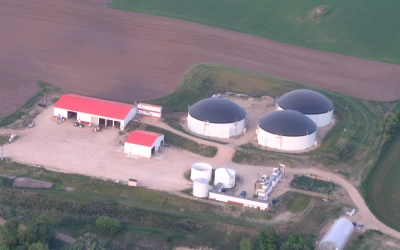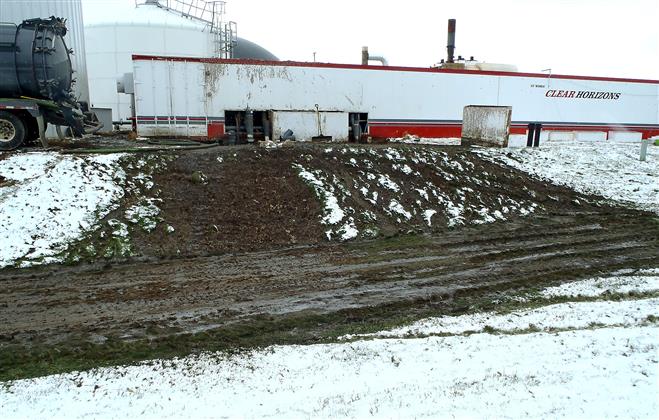By John E. Peck – FFD executive director
Published by Common Dreams, April 21st, 2024
There has been much media hype about manure digesters and how they will “solve” climate change by capturing and burning methane from confined animal feeding operations (CAFOs – aka factory farms). Billions in taxpayer handouts and other incentives through pollution offset trading markets are encouraging factory farms to expand and profit from their waste stream. Some economists now speculate that factory farms are earning more from making methane than milk! A recent FOE and SRAP report (https://foe.org/resources/biogas-or-bull/) goes even further suggesting that if the U.S. really wanted to reduce it’s agricultural contribution towards greenhouse gases, it would make more sense for regulators to phase-out/split-up CAFOs and shift taxpayer support towards smaller grass-based livestock operations instead.
Sadly, the misguided notion of manure digesters as a “solution” to the climate crisis is nothing new. Back in 2009 at the U.N. Climate Change Conference in Copenhagen I almost fell off my chair when then USDA Sec. Vilsack announced that manure digesters on factory farms were going to be a key part of Obama’s climate change agenda. He later admitted that less than 10% of dairy farms (ie CAFOs) would be large enough to qualify for these USDA digester grants – another example of how federal policies support industrial agribusiness to the detriment of smaller farmers.

This manure digester building binge has ramped up even more under Biden – with Vilsack once again back at the helm of the USDA. The latest IATP report (https://www.iatp.org/costly-versus-cost-effective) critiquing the Environmental Quality Incentive Program (EQIP) reveals just how much of this popular USDA effort has been hijacked by a small elite number of CAFOs, to the detriment of the majority of farmers who have their EQIP applications declined. Encouraging livestock grazing is NOT front and center among “climate smart” practices promoted under EQIP and NRCS – that star role is held by waste lagoons and manure digesters. A typical CAFO digester for 2000 dairy cows costs over $2 million with EQIP covering up to $400,000. But there are many other funds available, such as through the Rural Energy for America Program (REAP) which bankrolled $78 million for digesters in the last decade. The recent Inflation Reduction Act (IRA) added another $250 million to EQIP, along with another $2 billion for REAP, including a brand new 30% tax credit for all new digesters built.
The current trough of taxpayer funding for the manure methane industrial complex is long and deep, but there is even more potential revenue to be milked. In Wisconsin alone there are now fifteen manure digesters getting money for their methane offsetting of 1.3 million carbon credits available through the California Cap and Trade System. How does this work? Build a methane digester in WI, claim that by burning off this really bad methane it is equal to reducing the impact of so many tons of carbon dioxide emitted in CA, and then get a bonus check for that hard offset work! The value of one carbon credit on the CA market as of April 2023 was $28.66.
The problem with this taxpayer mandated and subsidized “cap and trade” system is that it does not necessarily reduce overall greenhouse gas emissions – it just moves pollution around (and the atmosphere doesn’t care about your zipcode…). Worse yet, if your offset claims prove to be bogus and corrupt, the climate crisis ends up much worse. This was exactly the case when Midwest activists alerted CA officials that some of the WI CAFOs claiming methane offset credits were really engaged in wire fraud since their digesters were either broken or not effectively functioning to capture methane as claimed. More details can be found in the SRAP expose of this 21st century Ponzi style scheme: (https://sraproject.org/news-and-events/california-cap-and-trade-program-summary/) Along with many allies, FFD has been diligently opposing such corporatized pollution trading mechanisms through the Alliance Against Farm Bill Offsets, whether they involve offsets for carbon sequestration pipelines, manure digesters, or “no-till” GMO monocultures.
My gut reaction fifteen years ago to Vilsack’s manure digester panacea to global climate change remains true today – why pay to fix a problem that doesn’t even need to exist? Countless studies have shown that the most cost effective, eco-friendly, and often quite profitable form of animal husbandry – including dairying – is managed rotational grazing. If animals are just allowed to enjoy pasture outside (as they prefer and are meant to do by mother nature) and then also allowed to deposit their manure in a healthy perennial ecosystem, one does not end up with a methane crisis. It is only when one decides to confine thousands of animals in a warehouse, offer them nothing but TMR to consume (with dubious components like feather meal and ethanol leftovers), liquify millions of gallons of their manure, and then store it in massive anaerobic lagoons, that one creates a pollutant 80+ times worse than carbon dioxide.
Sure, one can always capture and burn the methane that doesn’t leak from a CAFO digester to make electricity or run a vehicle (which means more greenhouse gas pollution), but you still have the leftover sludge (aka digestate) to deal with. This is loaded with nitrates, phosphorous, and – depending upon what other waste gets dumped into the digester – PFAS, pharmaceuticals, agrochemicals, heavy metals – which will then seep into the ground and became part of runoff, contributing to tainted wells, beach closures, toxic fish, the list goes on and on. Besides methane, there are other toxic CAFO gases – such as hydrogen sulfide, ammonia, and nitrous oxide – that cause chronic headaches for neighboring residents and hurt anyone else downwind.
And let’s not forget the ever present danger of methane explosions and lagoon ruptures. When a massive lagoon leaked on a hog factory farm in Wayne County NC in May 2022, spilling into the nearby Nahunta Swamp, it was revealed that hundreds of rotting pigs, along with deli meat and discarded hotdogs, were part of the digester feedstock to make the methane being sold to Duke Energy. Closer to home, just ask anyone who lives near Waunakee, WI, what it is like to have a poorly designed and managed digester both explode and also leak 400,000+ gallons of fresh manure into Lake Mendota about a decade ago. This single disaster set back Yahara Watershed clean up efforts for years. It would have been so much cheaper, simpler, and less disastrous for WI state and Dane county taxpayers to have promoted composting instead (which some better CAFOs actually do, without lagoons).

In Nov. 2022 Kari Lydersen wrote a disturbing investigation, chronicling the many risks to farm workers from factory farms and their manure digesters (https://energynews.us/2022/11/16/biogas-expansion-may-compound-worker-risks/). She tells one story of Bob Baenziger, Jr., retired Army veteran and former offshore oil rig diver, who died in 2021 as a hired contractor trying to fix a broken cable in an IA manure digester. Drowning in such a squalid pool is something straight out of Dante’s Inferno. The same year Samuel Antonio Padilla Castro, a Honduran immigrant, was working a twelve hour shift at the Fair Oaks Farm in IN when his clothing was caught in manure handling equipment, strangling him to death. His death left behind a widow, three children, and a token $10,500 OSHA fine. Austin Frerick’s profile of the McCloskey Family which owns Fair Oaks Farm in his new book, Barons, reveals more of the underbelly of this “Dairy Disneyland” including their role as digester cheerleaders. Another Fair Oaks tourist and digester advocate he mentions is Tom Vilsack.
Our current “get big or get out” farm policy does not have much time or interest in agroecological approaches for healthier food that also ensure food sovereignty. Instead, corporate agribusiness is allowed to manipulate commodity markets – driving out what little competition exists from smaller farmers and local processors. The political allies of the food giants then ensure that taxpayers help underwrite the largest industrialized operations left standing since they are the easiest to vertically integrate into the dominant oligopoly structure. Is it any surprise to see agribusiness lobbyists and their academic apologists now touting manure digesters as “climate smart” just in time for Earth Day and pushing for pollution trading offset schemes within the 2024 Farm Bill?
Thankfully, there are better responses to the climate crisis that also treat rural people and our land, air, and water with respect. Existing federal initiatives such as the Conservation Reserve Program could be expanded to better direct payments to farmers who are already doing so much responsible land/climate stewardship – without carbon offset peddlers skimming 25% off the top. The EQIP and REAP programs need to be overhauled to severely limit or even eliminate CAFO lagoon/digester grants and earmark more towards smaller grass-based diversified operations instead. This is the gist behind the EQIP Reform Act, introduced by Sen. Cory Booker (D-NJ) and Rep. Mike Lee (R-UT) last year as part of the Farm Bill debate.
More generally, factory farms must be treated as a pollution point source, subject to all the monitoring, regulation, and liability required for any other industrial operation. Why should CAFOs evade the common sense oversight that other businesses respect? Defending local control also remains critical. Last year grassroots activists in St. Croix County were able to push back and shut down a massive digester proposal near New Richmond, WI, being aggressively promoted by Nature Energy, a Shell Oil subsidiary. Thousands of folks recently responded to a statewide action alert successfully demanding that WI Gov. Tony Evers veto CAFO industry-crafted preemption legislation that would have hamstrung the right to pass ordinances that would restrict their manure digesters and other rural mal-development projects. Democratic direct action can get the goods!
NASA space probes have revealed that there is a massive ocean of liquid methane on Titan, one of the moons circling Saturn. There is also not any life that we know of on Titan… Intentional factory farm production and subsequent “climate smart” combustion of methane is not only oxymoronic, but will undermine the future prospect of life here on Earth. Farmers can feed the world and the cool the planet – without the false promise of manure digesters.






